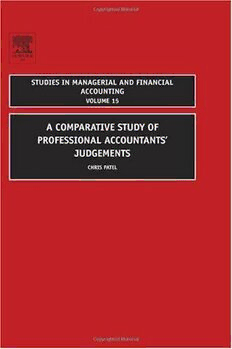
A Comparative Study of Professional Accountants' Judgements, Volume 15 (Studies in Managerial and Financial Accounting) (Studies in Managerial and Financial Accounting) PDF
229 Pages·2006·1.83 MB·English
Most books are stored in the elastic cloud where traffic is expensive. For this reason, we have a limit on daily download.
Preview A Comparative Study of Professional Accountants' Judgements, Volume 15 (Studies in Managerial and Financial Accounting) (Studies in Managerial and Financial Accounting)
Description:
This research monograph is an empirical examination of cultural influences on judgments of professional accountants from Australia, India and Malaysia in relation to a number of ethical issues in accounting including auditor-client conflict resolution, whistle blowing as an internal control mechanism and social desirability response bias. The study informs and guides both the theoretical specification and treatment of culture and its operationalization and methodology. It is shown that enhancement in the quality of cross-cultural research in accounting can be accomplished by providing greater insight into the depth, richness and complexity of cultural similarities and differences between and across nations by complementing the quantified dimensional based cultural measures with relevant historical, sociological and psychological literature. The findings of the study have implications for the management of multinational enterprises, the international convergence and harmonisation of accounting and auditing standards, and for cross-cultural accounting research. This research monograph would be particularly useful for researchers and research students interested in international dimensions of accounting and in ethical issues in international business.
See more
The list of books you might like
Most books are stored in the elastic cloud where traffic is expensive. For this reason, we have a limit on daily download.
